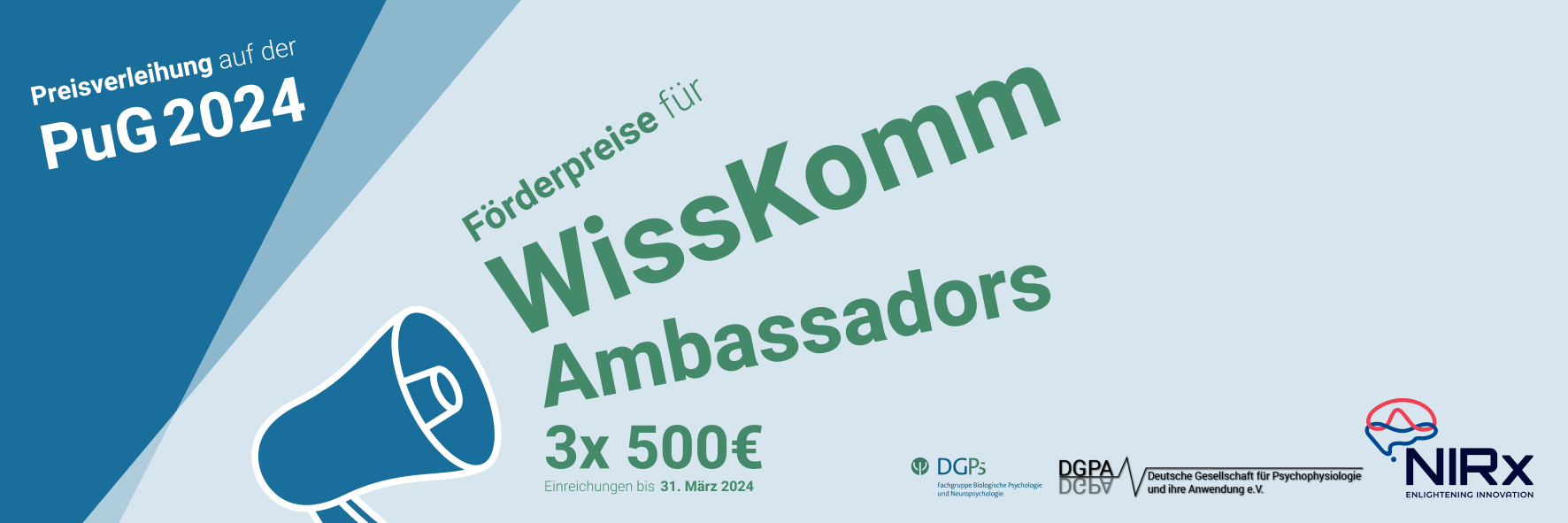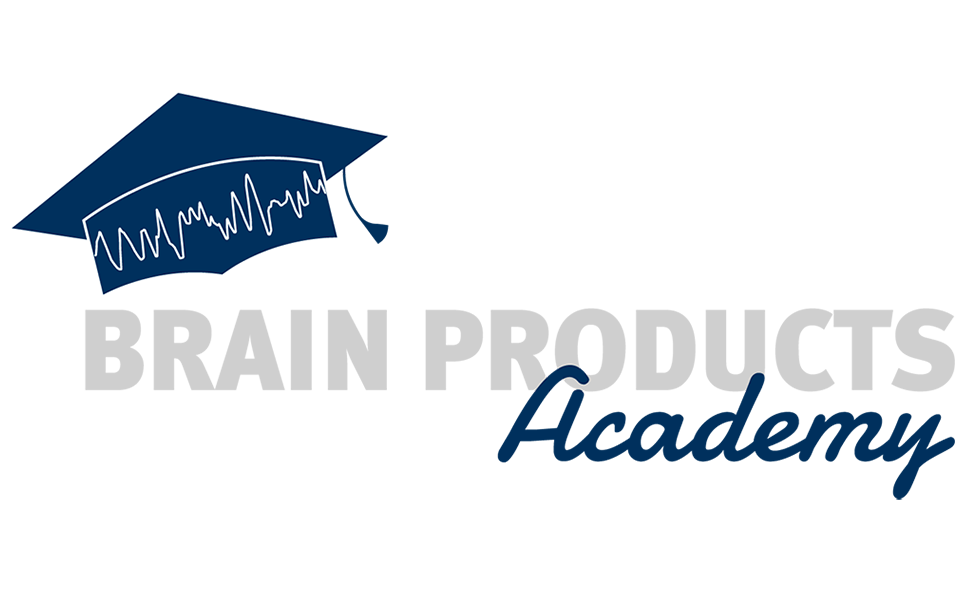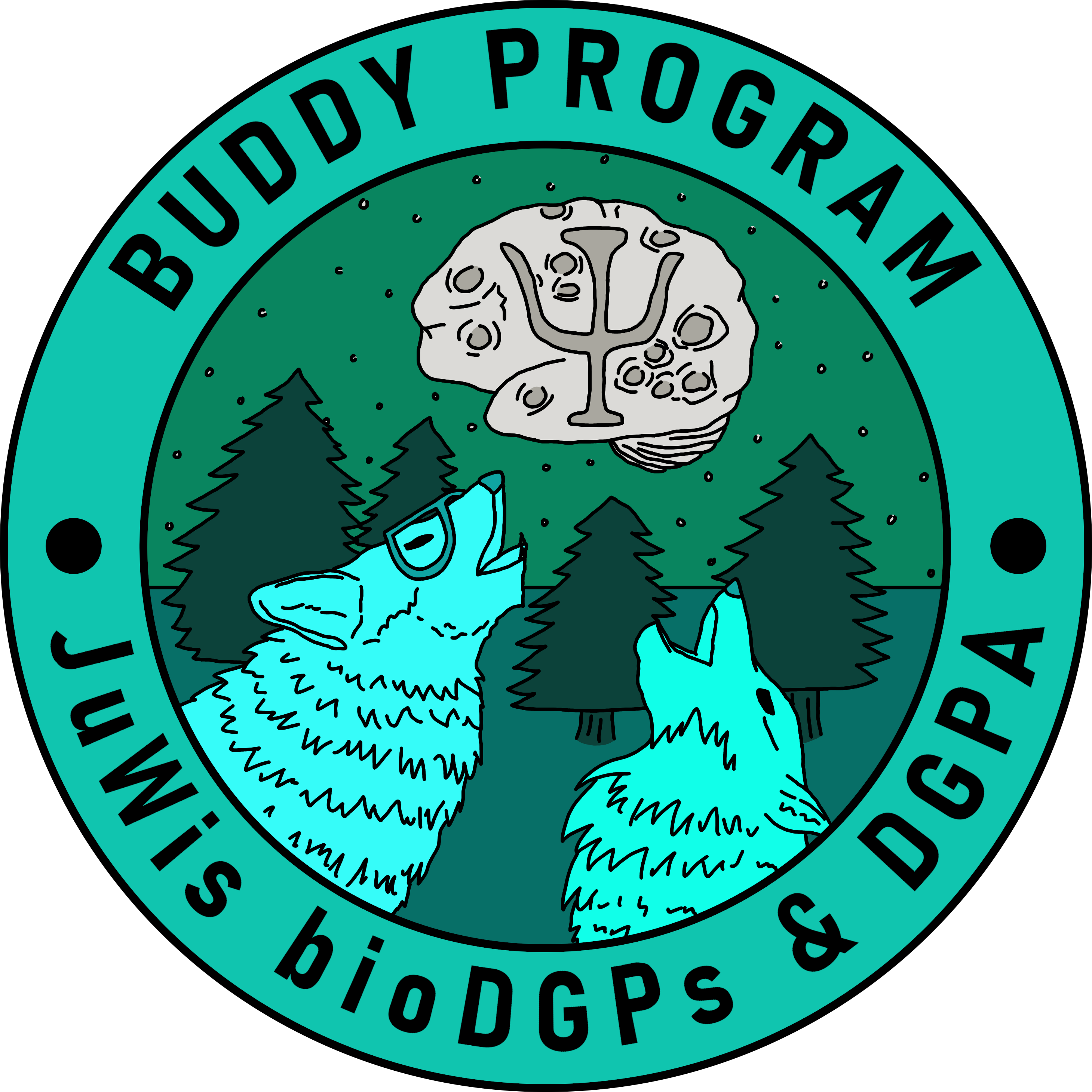Programme for the JuWis
The young scientist representatives of the division “Biological Psychology and Neuropsychology” of the DGPs and the DGPA are organizing various program items for and with young scientists in the context of the conference "Psychology and Brain". These include the pre-conference workshops, the Young Scientists Meeting, the Buddy-Program, the Supervisor Award, the Scicomm Prize and the Poster Flash.
If you have any questions or suggestions about the Young Scientists program, please feel free to contact us. These are the current young scientist representatives:
DGPs Section Biological Psychology and Neuropsychology:
Dr. Matthias Sperl matthias.sperl@psychol.uni-giessen.de
Deputy: Dr. Helena Hartmann Helena.Hartmann@uk-essen.de
German Society for Psychophysiology and its Application (DGPA):
Dr. Maria Meier maria.meier@uni-konstanz.de
Deputy: Marie Mückstein marie.mueckstein@ipu-berlin.de
The DGPA, the DGPs Division of Biological Psychology and Neuropsychology and the congress organizers support us in our offers for you young scientists. For this we would like to thank them very much!
PRE CONFERENCE WORKSHOPS
We are offering two workshops in the run-up to the conference. These will take place on Tuesday, 28 May 2024 (probably 9:00-18:00) and Wednesday, 29 May 2024 (probably 9:00-13:00). There will be a methods workshop on EEG to mark the "100 years of EEG in humans" anniversary, and a soft skills workshop on project management. Registration to both workshops will be open soon and work separately from the conference registration.
WORKSHOPS
We recommend early registration, as the number of participants per workshop is limited. Places will be allocated in the order of registration. Both workshops will be held in English. The cost per workshop is 20 euros for bioDGPs (section Biological Psychology and Neuropsychology) and/or DGPA members and 70 euros for non-members, and include participation including food. You can also become a new member during workshop registration.
To register, please send an e-mail to Anne Saulin (pug.workshops@gmail.com) including the following information: which workshop you want to participate in, your current status (PhD, PostDoc, etc.) and the status of your membership regarding the DGPA/bioDGPS.
Workshop 1 – Project management for scientists
The participants learn the basics of project management as it is commonly used in business and science - this course therefore represents a general introduction to this topic. At the same time, the focus of the course will be on the particularities that need to be taken into account when planning a doctorate. The techniques covered will be practiced on the participants’ individual doctoral cases. As a result, they create a plan for their (remaining) doctoral time and learn how to utilize it. Instead of presenting golden rules, the advantages and disadvantages of different project management procedures will be explained. Participants are encouraged to contribute their own preferences and experiences and to combine the various techniques presented. The workshop is designed in a way that doctoral candidates from all phases of the doctorate as well as postdocs in the early phase can be considered.
The following components of project management will be covered in the course:
- Structure and overview planning incl. Gantt diagram
- Agile techniques incl. Kanban and Scrum
- Analysis techniques incl. stakeholder analysis
- Project productivity and time management
Trainer
Dr. Alexander Egeling is a certified trainer and coach for scientists. He studied and worked at universities in Germany, Australia, and Canada. Specializing in research management, career planning and communication, he has more than 10 years of experience in higher education training. You can also book individual coaching sessions with him. Learn more at www.alexander-egeling.de.
Workshop 2 – Introduction to EEG data acquisition and ERP analysis
In this workshop we offer you the opportunity to learn how to acquire EEG data and how to conduct an ERP analysis using BrainVision Analyzer 2 – in celebration of 100 years of human EEG. On the first day we will cover the nature of the EEG signal and how to acquire an EEG signal, including hands-on practical measurements in small groups. On the second day we will introduce you to the BrainVision Analyzer 2 software and general principles of getting started with analysing EEG data for event related potentials (ERPs). The sessions include hands-on practice with demo data. The demonstrations are based on BrainVision Analyzer, but the knowledge imparted can also be applied to other software.
What To Expect:
- Learn from Brain Products and MES experts
- Rich program of lectures, demos, interactive sessions
- Comprehensive handouts, example datasets, and workshop materials
- Practical hands-on EEG acquisition in small groups with dedicated trainers
- Hands-on guided data analysis
- Theoretical background to the analysis methods used
The detailed program can be downloaded here.
Trainers
Brain Products GmbH
MES Forschungssysteme GmbH
Your specialist in the field of neurophysiological research. For 41 years we have been offering high-quality solutions from EEG, fNIRS and sensors to visual stimulation systems. These can be used stationary and mobile in the laboratory environment as well as in the open field or in MRI. MES is a competent partner in methodological combinations (EEG/MR, EEG/fNIRS) and stimulation (TMS/EEG, tDCS, tACS) for Germany, Austria and Switzerland.
Dr. Stefania Geraci
Stefania joined Brain Products in 2015 as Scientific Consultant. Stefania’s academic background is multidisciplinary: she is trained as biomedical engineer and during her time as researcher, she has explored different biomedical technologies. As member of the technical support team, she has gained experience in EEG and electrophysiology by supporting our customers with setting up their equipment and recording software for many different applications. Stefania brings her hands on experience and product specific knowledge to this Brain Products Academy workshop.
Dr. Bastian Schledde
Bastian is a member of the Scientific Support team at Brain Products since 2018. He supports users of the BrainVision Analyzer 2 in every aspect of their data analysis and engages in the development of Solutions to extend the functionality of Analyzer 2. Before joining Brain Products Bastian was trained in Neuroscience and Cognitive Science with a focus on visual cognition and analysis methods. As a researcher he conducted fundamental research on visual attention on a cellular and network level but is also experienced with EEG and Eye-tracking.
Dr. Shivakumar Viswanathan
Shivakumar (or Shiva) is a scientific consultant at Brain Products since January 2024 in the Education & Scientific Communication team. He comes to this role as an experienced neuroscientist having conducted research on diverse topics in motor control (and its disorders), cognition and perception using neuroimaging (EEG, fMRI), digitized behavior, and advanced machine learning and computational methodologies.
Dr. Tracy Warbrick
Tracy has been a member of the Brain Products team since 2015. After spending some time supporting our customers as a Scientific Consultant in both the Scientific and Technical Support Teams, she now focuses on our education and training solutions as the Head of Education and Scientific Communication. Simultaneously, Tracy is one of our application specialists for EEG-fMRI providing the best research solutions and training opportunities for our customers in this field. Prior to joining Brain Products, Tracy worked in academic research for several years using brain imaging methods to understand human behaviour, performance, and cognition. At that time, teaching and supervising research students was also part of her daily work, so she brings plenty of knowledge and experience to the Brain Products Academy.
Lydia Timm, PhD
Lydia received her PhD in the field of auditory Neuroscience in 2012. Since then she has held various positions at Brain Products and has worked for the past 5 years at MES Forschungssysteme in the sales and support department.
Young Scientists Meeting
The meeting of young researchers will start on Wednesday, 29 May 2024, probably around 2pm. The meeting is aimed at master's students, doctoral candidates, post-docs and junior professors and serves to exchange ideas and network all young scientists. First, the young member representatives of the DGPs Biological Psychology and Neuropsychology Section and the DGPA will report on their activities in the past year and give an outlook on the activities planned for the coming year. Any upcoming elections for the representative positions will then take place. We attach great importance to your suggestions and feedback.
Following the meeting, there will be another event for young scientists. In the past, for example, there have been panel discussions or discussion groups on hot-topic issues such as the Academic Fixed-Term Contract Act (Wissenschaftszeitvertrags-Gesetz), open science, or diversity in science. The topic and format of the 2024 event will be announced in the coming months.
Following the Young Scientists' Meeting, we will set off together for the conference welcome evening. We look forward to seeing you there!
Posterblitz
Our Posterblitz Symposium offers a stage for the young members of the society. Here, innovative research projects by you young scientists are presented to as broad a professional audience as possible. Specifically, the symposium consists of ten five-minute short presentations, each followed by three minutes of questions.
You can apply for participation in the poster flash when submitting your poster contributions. Simply check the appropriate box in the online form when submitting your abstract. So that we are not influenced by your results in our selection, we ask you to write an additional results-blind abstract for the poster flash. Among the submissions, we, a jury consisting of young scientists of the DGPA and the DGPs Section Biological Psychology and Neuropsychology, will select the best ten abstracts. We will then inform you in a timely manner about the selection. We look forward to your exciting abstracts! Our evaluation criteria are: Clarity of presentation, study design, theoretical derivation of hypotheses, and incorporation of open and reproducible science practices. We look forward to reading your abstracts!
Awards
Supervisor Award
As in previous years, this year we young scientists are again supplying the Supervisor Award of the DGPA and the DGPs Division Biological Psychology and Neuropsychology. The prize is awarded on the basis of a survey on supervision during the PhD. The aim of this survey is to honor excellent supervision. The prize will be awarded during the PuG social event.
Who can participate?
The survey is open to all individuals who are currently doing their doctorate (supervision relationship of at least 6 months) or who have completed their doctorate within the last 24 months. For a valid nomination, at least two independent evaluations must have been received for a supervising person.
In order to complete the survey, the nominated supervisor must be shown the Privacy Policy Information. This document is linked in the survey. Please forward the document to your nominated supervisor. A signature or other written confirmation is NOT necessary - it is sufficient to show the document.
The survey will be conducted online, the link to the survey will appear here in the coming weeks and will also be distributed via email.
All data collected in the survey will be analysed anonymously. We would like to take this opportunity to thank the Leibniz Institute of Psychology (ZPID), which is again responsible for data processing this year. They provide the survey via the Unipark platform and take care of the evaluation for us. We will only receive the contact details of the nominees in the first three places and anonymised, item-level data aggregated over all participants. It is not possible for us to connect the evaluating people to this data.
The survey is conducted online and can be started using the following link:
https://ww2.unipark.de/uc/dgpa-fg-biologische-psychologie-neuropsychologie/betreuerinnenpreis2024/.
The survey is open from now until 20 May 2024.
If you have any questions about the prize or the survey, please contact Angelika Dierolf (angelika.dierolf@uni.lu) wenden.
SciComm-Preis
As in previous years, we are again awarding the SciComm Prize to young scientists to promote excellent science communication in biopsychology. Here you can find more information about past prize winners and soon there will also be information about this year's application process. If you have any questions, please contact Helena Hartmann (helena.hartmann@uk-essen.de).
Happy applying!

BUDDY PROGRAMM
The Buddy Program will take place for the second time at the PuG and connects PuG newcomers (mentees) with experienced PuG participants (mentors) in so-called "buddy teams". The program is designed to help mentees get their bearings at PuG, meet nice people, and expand their network. Sign up for the Buddy Program by checking the appropriate box on the online registration form.
The basic idea
When attending a conference for the first time, it's easy to feel lost. It's not just a matter of mastering the logistics and finding the right lecture rooms at the right time. Making contact with other colleagues can also be a challenge. And then there's the social program - what should I take part in?
In our buddy program, mentors can be a helpful support: they introduce their mentees to the PuG world, give tips, provide an overview, and give a little push when it comes to networking. Conversely, the mentors also expand their network through their mentees and possibly get to know PuG from a different perspective.
What tasks do the mentors have and what can the mentees expect?
There are no fixed requirements for the individual buddy teams. We recommend at least one personal meeting before or at the start of the PuG, for example during the welcome evening. Mentors can share tips and tricks about the PuG process (e.g., "How do I decide which sessions to attend?" or "How do I minimize stress during a packed PuG day?"), recommend events (e.g., the JuWi meeting), or introduce their mentee to colleagues. Informal exchanges about research topics or introducing other colleagues are also ways to help mentees get off to a good start in the PuG community. Mentors can also be available to answer questions during and before the PuG. Young scientists who are already receiving support through their research group can benefit from the additional perspective that "external" mentors can provide.
Registration and procedure
If you are interested in participating in the Buddy Program as a mentor or mentee, please indicate it by checking the box in Conftool.
We will contact you in May to let you know who your buddy team partner is. You will then have enough time to contact your buddy by e-mail in the run-up to the PuG.
Who is considered a young scientist?
A young scientist is any person who has not yet obtained a doctorate or did not obtain her doctorate a maximum of eight years ago and who has not yet been appointed to a full professorship (W2/W3).
The period is extended by one year for each child cared for.



